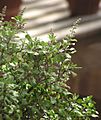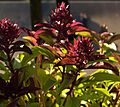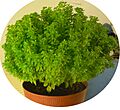List of basil cultivars facts for kids
Basil is a popular herb known for its amazing smell and taste. There are many different kinds, or cultivars, of basil. People use basil in many ways, like in cooking, for decorating gardens, in traditional medicine, for making teas, and even in religious ceremonies.
All real basils belong to a plant group called Ocimum. This group is very diverse, meaning it has many different types of plants. Some are annuals, which means they grow for one season and then die. Others are perennials, which come back year after year, or even shrubs. These plants originally came from Africa and other warm, tropical, and subtropical parts of the world.
Scientists believe there are between 50 and 150 different types of basil. Most of the basil we use for cooking comes from a species called O. basilicum, also known as sweet basil. However, some cooking basils are from other species or are hybrids, which are mixes of two different types. It can be tricky to figure out exactly which species a basil belongs to because they can easily cross-breed. This is why scientists sometimes reclassify them.
Basil cultivars look and smell very different from each other. Their leaves can be huge, like the 'Mammoth basil' or 'Lettuce leaf basil', or tiny, like the 'Dwarf bush basil'. The smell of basil changes because of the different essential oils inside the plants. These oils include things like cineol, linalool, citral, and eugenol, which give each basil its unique scent.
Contents
Types of Basil: A World of Flavors
There are many exciting types of basil, each with its own special look and taste. Let's explore some of the most common and interesting ones.
Sweet Basil and Its Relatives
Most of the basil you find in stores is a type of sweet basil. It's famous for its strong, clove-like smell.
- Sweet basil or Genovese basil (O. basilicum): This is the classic basil with a strong clove scent.
- Lettuce leaf basil (O. basilicum 'Lettuce Leaf'): This basil has very large leaves, sometimes used in salads.
- Mammoth basil (O. basilicum 'Mammoth'): Another large-leaf type, with a stronger flavor than regular sweet basil.
- Genovese basil (O. basilicum 'Genovese Gigante'): Very popular, tastes similar to sweet basil.
- Nufar basil (O. basilicum 'Nufar F1'): A type of Genovese basil that can resist a plant disease called fusarium wilt.
- Spicy globe basil (O. basilicum 'Spicy Globe'): Grows in a small, round bush shape with tiny leaves and a strong flavor.
- Greek Yevani basil (O. basilicum 'Greek Yevani'): An organic version of Spicy Globe basil.
- Fino verde basil (O. basilicum piccolo): Has small, narrow leaves. It's sweeter and less strong-smelling than larger-leaf basils.
- Boxwood basil (O. basilicum 'Boxwood'): Grows very tightly, like a boxwood shrub. It has tiny leaves, a strong flavor, and is great for making pesto.
Colorful and Unique Basils
Some basil types stand out with their beautiful colors and distinct flavors.
- Purple ruffles basil (O. basilicum 'Purple Ruffles'): This basil is completely purple. It has a rich, spicy taste, a bit like anise.
- Magical Michael (O. basilicum 'Magical Michael'): An award-winning type that grows very evenly and has a nice flavor for cooking.
- Dark opal basil (O. basilicum 'Purpurascens'): Another award-winning type, first grown at the University of Connecticut in the 1950s.
- Red rubin basil (O. basilicum 'Purpurascens' 'Red Rubin'): This basil has a strong magenta color and tastes similar to sweet basil. It's also called Opal basil.
- Osmin purple basil (O. basilicum 'Osmin Purple'): Dark, shiny purple leaves with jagged edges. Its leaves are smaller than Red Rubin.
- Cuban basil (O. basilicum): Similar to sweet basil but with smaller leaves and a stronger flavor. It often grows from cuttings.
Asian-Inspired Basils
Many basil varieties are popular in Asian cooking, offering unique aromas.
- Thai basil (O. basilicum var. thyrsiflorum): Called Ho-ra-pa (โหระพา) in Thai. It smells like licorice because of a chemical called estragole.
- Siam Queen (O. basilicum var. thyrsiflorum 'Siam Queen'): A specific type of Thai Basil.
- Cinnamon basil (O. basilicum 'Cinnamon'): Also known as Mexican spice basil. It has a strong scent like cinnamon and purple flowers.
- Licorice basil (O. basilicum 'Licorice'): Also called Anise basil or Persian basil. It has silvery leaves and a spicy licorice smell from a chemical called anethole. Thai basil is sometimes also called Licorice basil.
- White basil (O. basilicum var. pilosum): This basil has white, hairy branches and leaves, and white flowers. It has a lemony scent and is called é (é) in Vietnamese.
Lemon and Lime Basils
These basils are known for their fresh, citrusy smells.
- Mrs. Burns' Lemon (O. basilicum var. citriodora 'Mrs. Burns' Lemon'): Has a clean, strong lemon scent, similar to other lemon basils.
- Lemon basil (O. americanum): This basil truly smells lemony because it contains chemicals like citral and limonene. It tastes sweeter. It was originally called "hoary basil" and is popular in Indonesia as 'kemangi'.
- Lime basil (O. americanum): Very similar to lemon basil.
Special Hybrids and Other Basils
Some basils are unique hybrids or different species altogether, each with its own special qualities.
- Greek column basil (O. ×citriodorum 'Lesbos'): This basil grows in a tall, narrow shape like a column. It can only be grown from cuttings, not seeds.
- Thai lemon basil (O. ×citriodorum): Called mangluk (แมงลัก) in Thai. It has a citrus smell and a distinct flavor similar to lemon balm.
- Holy basil (O. sanctum or O. tenuiflorum): Also known as sacred basil or Tulsi (तुलसी) in Hindi. This perennial plant from India is used in Ayurveda (traditional Indian medicine), for worship, and in Thai cooking, where it's called kaphrao (กะเพรา).
- Clove Basil (O. gratissimum): This basil has a strong clove-like scent.
- Greek basil (O. minimum or O. basilicum var. minimum): Also called Greek spicy globe Basil. It grows into a nearly perfect round shape with thin, tiny leaves and a wonderful scent. Even though it's called Greek basil, it probably came from Chile.
- Dwarf bush basil (O. minimum): An unusually small bush type, similar to Greek bush basil.
- African blue basil (O. kilimandscharicum × basilicum): This is a special hybrid that doesn't produce seeds. It has purple leaves and a strong scent of camphor.
- Spice basil (O. basilicum × americanum): A type with a fruity or musky scent, sometimes sold as Holy Basil.
- Sweet Dani basil (O. basilicum × americanum): A strong, large-leaved green basil with a fresh lemon scent. It won an All-American Selection award in 1998.
- Camphor basil (O. kilimandscharicum): This basil is known for its camphor scent.
Images for kids
See also
- International Code of Nomenclature for Cultivated Plants
- Lists of cultivars






